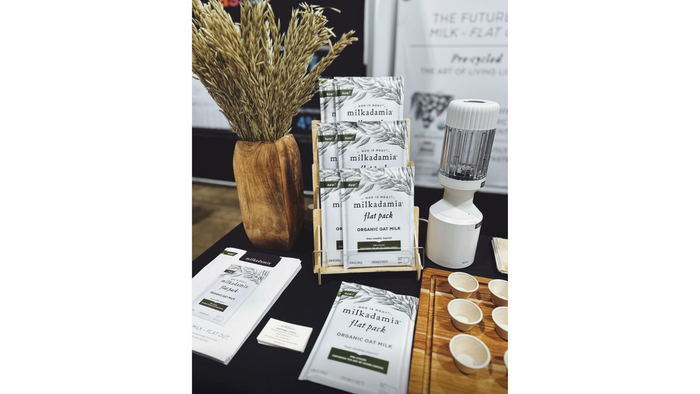.png?width=700&auto=webp&quality=80&disable=upscale)
Milkadamia launches sustainable Organic Oat Milk sheets made with 2D printersMilkadamia launches sustainable Organic Oat Milk sheets made with 2D printers
Flat-pack Organic Oat Milk offers a fresh, eco-friendly option with 94% less packaging—perfect for vegans and eco-conscious buyers. Learn more about this sustainable innovation.

At a Glance
- Pre-cycling reduces packaging coming from the producer and addresses consumers’ environmental concerns.
- Sustainable, cost-effective oat milk sheets provide consumers with fresh, plant-based milk while reducing food waste.
- Regenerative farming practices and the use of North American oats are evidence of Milkadamia’s dedication to sustainability.
“It’s not astronaut food,” says milkadamia Founder and CEO Jim Richards. But after people taste it and understand it, “enthusiasm rockets.”
Printed sheets of oat milk may sound like something out of the NASA lab—or the USS Enterprise galley. But the milk is as natural as you can get, Richards says. It’s the delivery format that’s so hi-tech it could spark a smile in emotion-less Mr. Spock under an oat milk mustache, of course.
The Organic Oat Milk is printed by a giant 2D printer. The consumer tears off a portion of a sheet, adds water and blends for under a minute or soaks it overnight. They can make as much fresh oat milk as they’d like for that serving, which helps reduce food waste. Each pack contains eight sheets, which can make a half a gallon of oat milk.

Milkadamia Flat-Pack Oat Milk comes in sheets that can be blended within a minute or soaked overnight to become a beverage.
“It’s 94% less packaging, 85% less weight and 100% less disheartening,” Richards says. It’s also 20-30% less expensive than other plant-based milks. The technology comes from the printing industry, not the food industry, he says. Milkadamia, makers of a line of premium macadamia nut milk, licenses the technology from Vitiprints LLC, whose motto is “The Future is Flat.” German company Veganz launched 2D-printed plant milk products last year in Europe using the technology, to great success.
Milkadamia will be the first to introduce flat-pack milk in the U.S. when Flat Pack Organic Oat Milk hits stores in the first quarter of 2025, soon to be followed by flat-pack almond milk. Flat-pack macadamia milk is trickier for the printer, as the nuts are about 80% oil. But sheets of macadamia milk are coming, says Richards.

“Packaging has another name and that’s garbage,” he says. There’s not a time when on the way back from the recycling bin “you’re leaping for joy. It’s disheartening. You know that some of it’s going to end up in the ocean, in landfills. You know the idea of recycling is largely a myth and mostly isn’t happening.” Only about 27% of Tetra Paks, a favored container for plant-based milks, goes to recycling, according to the company’s 2023 Sustainability Report.
Pre-cycling—when the manufacturer does the heavy lifting for the consumer—is a solution, Richards says. “Pre-cycling removes the burden from consumers as much as we can.”
Instead of the burden, consumers get a boost. That’s the “100% less disheartening” part. Less waste in the supply chain plus the health and green benefits of plant-based milk spark a good feeling, the opposite of cringey recycling bins, he says. People are doing something to solve a problem. And, as the oat milk is mostly used in the morning, it “starts your day right. It’s an uptick instead of a downtick.”
That spark of good feeling is critical, he says. “Once we have the human spirit involved looking for solutions and working together, we can do anything. It’s about finding the triggers that make that happen,” creating momentum. “If people can consciously make an effort to replace something that used to be disheartening, if they can do it for one thing, they’re likely to take the next step and then the next step.
“A lot of people are waiting for technology to save us,” he says. “It might be not some big machine that sucks CO2 out of the sky. It might be a lot of much simpler things—and we can't wait for the one big magical thing to occur.”

For manufacturers, slashing packaging and weight may seem magical. “Nobody likes shipping off diesel-belching truckloads of a beautiful product,” says Richards, who can speak to his own experiences with the supply chain for milkadamia’s regeneratively grown macadamia nut milks.
Milkadamia’s history is based in regenerative methods used on a family farm on Australia’s east coast. To meet demand, the brand has since needed to source nuts from farms beyond their acres. The oats are grown in North America. With roots dug so deeply in, literally, the salt-of-the earth, would the Jim Richards who obsessed—“probably to an unhealthy degree,” he says with a laugh—over dirt back when the company sold only macadamia nut milk be baffled by the company’s next-gen products? “I would have been shocked,” he says. “But as it’s unfolded, it fits perfectly with what we care about, the things that matter to us.”
Will the DIY step deter some customers from buying Flat Pak Oat Milk? Yes, says Richards. But this product is not aimed at those customers. “People who purchase plant-based milk already thought they were purchasing a ticket to something better, an improvement in some way,” he says. The flat packs just are the next step. “Is convenience so important to us that we're going to convenience our way into oblivion,” he asks. “Or are there other things that actually are more important?”
About the Author
You May Also Like





